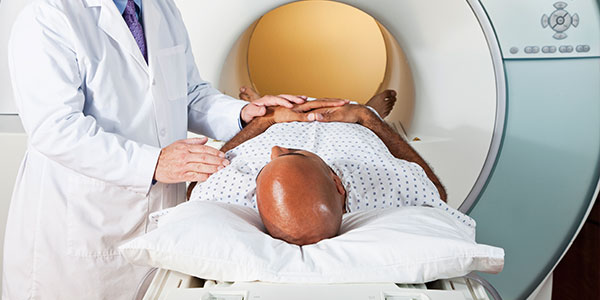Prostate cancer is one of the most common cancers diagnosed in American men. As with most cancers, if your prostate cancer is caught early, you have a good chance of recovery. Our PAMF prostate cancer care teams, including urologists, oncologists and surgeons, are highly experienced and actively seeking new, more effective treatments. Through our tumor board, you have access to a multidisciplinary team of specialists who meet on a regular basis to review and discuss prostate cancer treatment options.

Diagnostics
Your PAMF specialist may order a variety of tests to diagnose prostate cancer.
- Prostate-specific antigen blood test — An elevated PSA may indicate prostate cancer, and this screening test can be administered annually, usually beginning at age 50.
- Digital rectal exam — This examination is an important part of evaluating the prostate’s size, shape and consistency and can identify areas suspicious for cancer.
- Diagnostic imaging — Multi-parametric prostate MRI is a valuable test that can identify areas suspicious for prostate cancer. If your MRI scan is normal, you can likely forgo biopsy; if the MRI reveals something suspicious, you can undergo targeted biopsy. Other useful imaging studies include CT scans, PET-CT scans and nuclear medicine bone scans to identify possible areas of cancer progression.
- Ultrasound-guided prostate biopsy — Small samples of tissue are removed from the prostate using a needle guided by transrectal ultrasound (TRUS). If an MRI shows a suspicious lesion, your urologist may use an MRI-US fusion system to guide the biopsy needle to the exact location for tissue removal.
Treatments
Your prostate cancer specialist will help you understand all of your treatment choices so you can make the one that is right for you. Services we offer include:
- Active surveillance — Some cases of prostate cancer are not life threatening, and your care team may recommend watchful waiting with regular follow-up,including exams, PSA testing, and MRI-guided biopsy as needed.
- Surgery — A common cure for prostate cancer is to remove the entire gland and surrounding tissue in a radical prostatectomy; for early-stage cases, options include a laparoscopic radical prostatectomy using several small incisions or cryosurgery using extreme cold and TRUS for guidance.
- Focal therapy — You may not be comfortable with “watchful waiting” without treatment, but you may also want to avoid the risks of traditional, whole-prostate treatments such as surgery and radiation. Focal therapy offers a new option for men with localized or slower growing prostate cancer. Focal therapy targets the cancerous area but leaves the rest of the prostate alone, reducing risk of side effects. Benefits for this new treatment are preliminary but encouraging. Talk with your doctor about whether focal therapy may be right for you.
- Radiation therapy — Used in place of or with a prostatectomy, 3D conformal therapy (3D-CRT), intensity modulated radiation therapy (IMRT), Volumetric Arc Therapy and prostate brachytherapy all minimize damage to healthy tissue.
- Hormone therapy — To slow the growth of the cancer, hormone therapy limits the body’s ability to make male sex hormones.
- Immunotherapy — A treatment to boost the body’s immune system to attack cancer cells.
- Transurethral resection of the prostate (TURP) — If surgery to remove the prostate isn't an option and you have trouble urinating, a minimally invasive surgery to remove part of the prostate, called TURP, may be an option for you.
Services and Support
We understand that cancer patients may need services and support that go beyond the clinical treatment.
- Cancer rehabilitation — From classes on urinary incontinence to yoga classes oriented for your needs during rehabilitation, PAMF is committed to your recovery.
- Complementary therapies — You may benefit from integrative health options at PAMF, including pet therapy, art therapy, guided imagery, acupuncture and other nontraditional therapies.
- Counseling — We can connect you with psychological and financial counseling services, as well as support groups.
- Nutrition counseling — Certified oncology dietitians advise you and your caregivers on how to improve overall nutrition, promote healthy eating habits and enhance overall well-being and quality of life.
Treatment Team
Prostate cancer, like most other cancers, benefits from a team approach. The following care providers may be part of your care team:
- Urologist — Urologists are the doctors who diagnose prostate cancer and are the surgeons of the prostate and urinary tract. Urologists at PAMF are experts in robot-assisted laparoscopic prostatectomy using the state-of-the-art da Vinci surgical system.
- Radiation Oncologist — These doctors specialize in radiation treatment for cancer.
- Medical Oncologist — “MedOnc” doctors treat all kinds of cancer. They administer chemotherapy as well as hormone-blocking medications to treat prostate cancer and medications to increase bone strength.
- Genetic Counselor — These medical staff can help inform and guide men with prostate cancer.
Related Information














